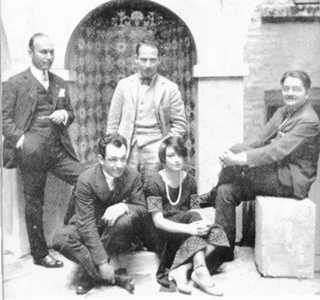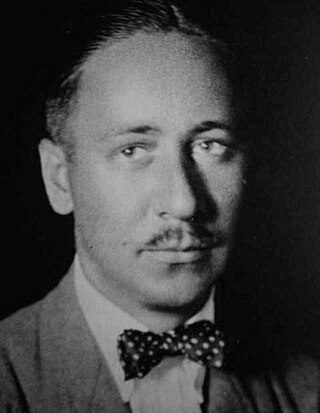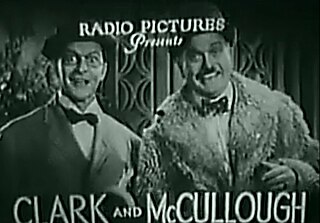
Irving Berlin was an American composer and lyricist. His music forms a large part of the Great American Songbook.

This is a list of notable events in music that took place in the year 1942.
This is a list of notable events in music that took place in the year 1946.
This is a list of notable events in music that took place in the year 1924.

The Algonquin Round Table was a group of New York City writers, critics, actors, and wits. Gathering initially as part of a practical joke, members of "The Vicious Circle", as they dubbed themselves, met for lunch each day at the Algonquin Hotel from 1919 until roughly 1929. At these luncheons they engaged in wisecracks, wordplay, and witticisms that, through the newspaper columns of Round Table members, were disseminated across the country.

Robert Charles Benchley was an American humorist best known for his work as a newspaper columnist and film actor. From his beginnings at The Harvard Lampoon while attending Harvard University, through his many years writing essays and articles for Vanity Fair and The New Yorker and his acclaimed short films, Benchley's style of humor brought him respect and success during his life, from his peers at the Algonquin Round Table in New York City to contemporaries in the burgeoning film industry.
Harry Akst was an American songwriter, who started out his career as a pianist in vaudeville accompanying singers such as Nora Bayes, Frank Fay and Al Jolson.
"You're Just in Love" is a popular song by Irving Berlin. It was published in 1950 and was first performed by Ethel Merman and Russell Nype in Call Me Madam, a musical comedy that made its debut at the Imperial Theatre in New York City on October 12 that year. The show ran for 644 performances. Ethel Merman also later starred in the 1953 film version. Theatre lore has it that Berlin wrote the song one night after Call Me Madam was not doing well in tryouts. The second act of the show was lacking. "What I'd like to do is a song with the kid ," Merman said. So, Berlin went to his room and later produced the counterpoint song. When Berlin played the song for Merman, she said, "We'll never get off the stage." Reportedly, Berlin played the song for Russell Nype first, but admonished him not to admit he did so because it would infuriate Merman.

Sam Bernard was an English-born American vaudeville comedian who also performed in musical theatre, comic opera and burlesque and appeared in a few silent films.

The Music Box Theatre is a Broadway theater at 239 West 45th Street in the Theater District of Midtown Manhattan in New York City. Opened in 1921, the Music Box Theatre was designed by C. Howard Crane in a Palladian-inspired style and was constructed for Irving Berlin and Sam H. Harris. It has 1,025 seats across two levels and is operated by The Shubert Organization. Both the facade and the auditorium interior are New York City landmarks.

Oscar Shaw was a stage and screen actor and singer, remembered primarily today for his role as Bob Adams in the first film starring the Marx Brothers, The Cocoanuts (1929). United States census records show that Shaw was already working as a stage actor in 1910, while still living with his mother, brother, and stepfather.

John W. Steel was an American tenor. He was featured in the Ziegfeld Follies of 1919 and 1920 and Irving Berlin's Music Box Revues of 1922 and 1923.

As Thousands Cheer is a revue with a book by Moss Hart and music and lyrics by Irving Berlin, first performed in 1933. The revue contained satirical sketches and witty or poignant musical numbers, several of which became standards, including "Heat Wave", "Easter Parade" and "Harlem on my Mind". The sketches were loosely based on the news and the lives and affairs of the rich and famous, as well as other prominent personalities of the day, such as Joan Crawford, John D. Rockefeller Jr., Noël Coward, Josephine Baker, and Aimee Semple McPherson.
The Treasurer's Report (1928) is a comedy sketch, made into a short film, written and performed by Robert Benchley. The film, made in the then-new Fox Movietone, documents an assistant treasurer of an organization struggling to present its yearly report. This was the first of Benchley's 46 comedy short films, with six made for Fox, one each for Universal Pictures and RKO Radio Pictures, 29 for Metro-Goldwyn-Mayer, and nine for Paramount Pictures.

Robert Edwin Clark, known as Bobby Clark, was a minstrel, vaudevillian, performer on stage, film, television and the circus. Known for his painted-on eyeglasses, he was part of a comedy team with Paul McCullough for 36 years.
Erich Karl Löwenberg, known as Erik Charell, was a German theatre and film director, dancer and actor. He is best known as the creator of musical revues and operettas, such as The White Horse Inn and The Congress Dances.

Hubert Edward Hassard Short, usually known as Hassard Short, was an actor, stage director, set designer and lighting designer in musical theatre who directed over 50 Broadway and West End shows between 1920 and 1953. Theatre historian Ken Bloom called him "one of Broadway's greatest directors and lighting designers", while theatre writer John Kenrick described him as a "groundbreaking director and choreographer".

Sam H. Harris was a Broadway producer and theater owner.
"Say It with Music" is a popular song written by Irving Berlin. It was introduced in the Music Box Revue of 1921, where it was the de facto theme song and sung as a duet. The song was popularised by Paul Whiteman and His Orchestra on 30 August 1921; this recording debuted on the charts on 12 November of that year, remained there for 14 weeks and peaked at number 1. Other popular versions in 1921/22 were by John Steel and by Ben Selvin.

This Is The Army is an American musical revue in two acts, designed to boost morale in the U.S. during World War II, with a book by James McColl and music and lyrics by Irving Berlin. It was produced by the U.S. Army on Broadway in 1942, with a cast of U.S. soldiers, for the benefit of the Army Emergency Relief Fund.












